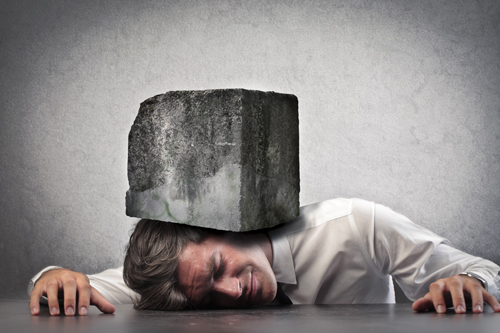 “You were late because you got stuck on the D train? That’s odd, because the D train was closed for track work last night. I know that because I had to switch to the Q.”
“You were late because you got stuck on the D train? That’s odd, because the D train was closed for track work last night. I know that because I had to switch to the Q.”
“Did I say the D? I meant the Q!”
“But I thought you said you met your friend Bob at his office. How did you end up on the Q? He works on the Upper East Side.”
“We met at his office, but we decided to go to Chinatown for dinner.”
“Chinatown? Bob? After his parents were killed in that terrible chopstick factory fire, he vowed never to eat Chinese food again.”
Jesus said to the Pharisees in the Temple: “And ye shall know the truth, and the truth shall make you free.” “How sayest thou, Ye shall be made free?” they asked him. “We were never in bondage.”
“Verily, verily, I say unto you,” Jesus explained, “whosoever committeth sin is the servant of sin.”
Setting all the doctrinal implications aside (and there are a lot of them in those lines), Jesus spoke a psychological truth that anyone can recognize and acknowledge. No sooner do we utter one untruth than we become the captive of many; the simplest lie inevitably ramifies as we are compelled to rearrange the rest of reality to comport with it.
Any lie, even a well-intended white lie, can lead us into a labyrinth of bad faith—or at the very least, make us feel guilty, unhappy, and stressed out.
“Not lying improved the health of both groups, but much more so for the group that had embarked on a deliberate program of honesty.” Habitual lying is not just bad, but bad for us. A ten-week experiment that was subsidized by the John Templeton Foundation and supervised by Anita E. Kelly and Lijuan Wang of the Notre Dame Department of Psychology, confirms this.
A Life Without Lies: Can Living More Honestly Improve Health? was presented at the 2012 Annual Convention of the American Psychological Association. The experiment was designed to answer three questions:
- Can people rewire themselves for honesty? (most people tell one or two lies a day, for an average of 11 per week);
- Does more honesty make for better health?; and
- If so, how can it be explained?
Researchers recruited 110 adults, ages 18 to 71, for the experiment—63 percent of them women, 87 percent white, 4 percent black, 4 percent Hispanic, and 3 percent Asian (the other 2 percent were “other”). Their incomes ranged between $25,000 and $160,000.
Participants were randomly assigned to a control group and a “no-lie group.” Members of the no-lie group formally agreed to “refrain from telling any lies for any reason to anyone.” Both groups were administered weekly polygraph tests, in which they were asked questions about their health and how many lies they had told.
“When participants in the no-lie group told three fewer white lies than they did in other weeks, they experienced on average about four fewer mental-health complaints, such as feeling tense or melancholy, and about three fewer physical complaints, such as sore throats and headaches.” The no-lie group not only reported telling fewer lies than the control group; they had significantly fewer mental- and physical-health complaints. According to a report on the Notre Dame website, “when participants in the no-lie group told three fewer white lies than they did in other weeks, they experienced on average about four fewer mental-health complaints, such as feeling tense or melancholy, and about three fewer physical complaints, such as sore throats and headaches….In contrast, when control group members told three fewer white lies, they experienced two fewer mental-health complaints and about one less physical complaint. The pattern was similar for major lies, Kelly said.”
Not lying improved the health of both groups, but much more so for the group that had embarked on a deliberate program of honesty. Why is that? Perhaps it was because of the improvement they experienced in their relationships. “Statistical analyses showed that this improvement in relationships significantly accounted for the improvement in health that was associated with less lying,” Wang noted.
Always tell the truth, my father-in-law frequently says; it’s easier to remember. Truth telling makes you feel better about yourself—and it makes you feel better, too.



